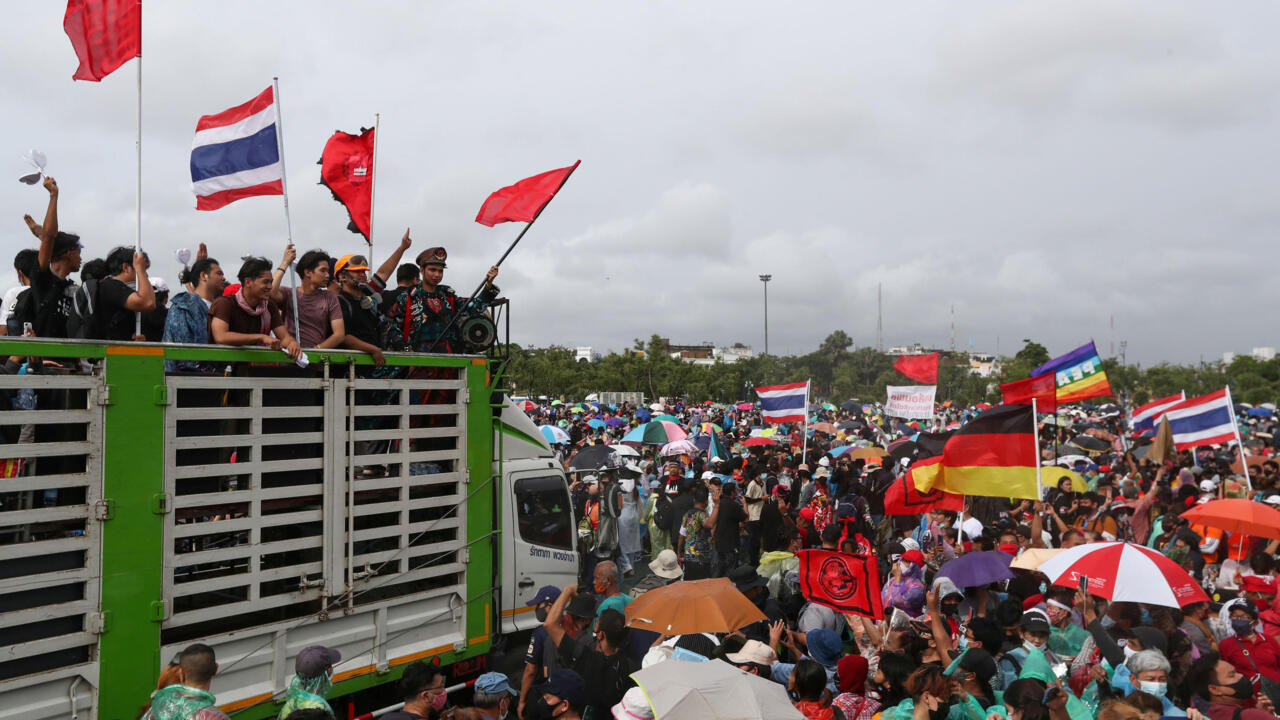Thousands of young people began to demonstrate, Saturday, September 19, in Bangkok, launching a two-day mobilization which promises to be massive against the government in order to obtain the resignation of the Prime Minister, more democracy, and even a reform of the monarchy, a taboo subject in Thailand.
Organizers hope to bring together at least 50,000 people.
It would then be the biggest rally since the 2014 coup d'état that brought the current head of government, Prayut Chan-O-Cha, to power, since legitimized by controversial elections.
In the early afternoon, several thousand demonstrators gathered on the campus of Thammasat faculty, in central Bangkok, after having forced the doors.
Thai protesters give pro-democracy salute in front of the Grand Palace in Bangkok.
By @jgesilva # 19 กันยา ทวง อํา นา จ คืน รา ษ ฏ ร # ThailandProtest2020 #WhatsHappeningInThailand pic.twitter.com/a9YkhjVnxR
- Matthew Tostevin (@TostevinM) September 19, 2020
The place is symbolic: on October 6, 1976, dozens of students, who were protesting against the return of a military regime after a parenthesis of three years of democracy, were killed there by the security forces supported by two militias. ultraroyalists.
Opponents began to leave the campus to go, three fingers raised in defiance, to the iconic Sanam Luang square, a royal ceremonial field in front of the Grand Palace, AFP journalists noted.
The rally is expected to last until Sunday: demonstrators must then march towards the Government House to present their grievances.
Mostly young people
"Down with dictatorship, long live democracy", "Prayut out" chanted opponents, some belonging to the movement of "red" shirts close to the ex-Prime Minister in exile Thaksin Shinawatra, bête noire of the government.
"The young people of this country see no future," noted in a statement the former head of government, overthrown by a coup d'état just 14 years ago, without explicitly supporting the movement.
The protest, which has paraded in the streets almost daily since the summer, mainly brings together young people, students and urbanites.
"Will they manage to rally the popular classes? This demonstration is a test," said Christine Cabasset, researcher for the Institute for Research on Contemporary Southeast Asia.
Huge crowd in Bangkok.
Many thousands of Thais are protesting today against the government and also demanding reforms to the monarchy.
# 19 กันยา ทวง อํา นา จ คืน รา ษ ฏ ร #WhatsHappeninginThailand pic.twitter.com/L1Fymq50mj
- Matthew Tostevin (@TostevinM) September 19, 2020
At the heart of their demands, the end of the "harassment" of political opponents, the dissolution of Parliament with the resignation of Prayut Chan-O-Cha and the revision of the Constitution of 2017, written during the time of the junta and deemed too favorable to the army.
Part of the movement goes further, daring to confront royalty.
Unheard of in the country where, despite successive overthrow of regimes (12 coups d'état since 1932), the monarchy remained untouchable until now, protected by one of the most severe lese majesty laws in the world.
"We are fighting for more democracy," Panusaya Sithijirawattanakul told AFP, said Rung, one of the movement's organizers.
"Our goal is not to destroy the monarchy, but to modernize it, to adapt it to our society."
The powers of the monarchy strengthened in recent years
Their demands are no less daring: they demand the king's non-interference in political affairs, the repeal of the lese majesty law and the return of the property of the Crown to the bosom of the State.
The Thai sovereign, well beyond his status as constitutional monarch, has considerable influence which he exercises most often in the shadows.
The current monarch, Maha Vajiralongkorn, who ascended to the throne in 2016 after the death of his father, the revered King Bhumibol, is a controversial figure.
In a few years, he strengthened the powers of an already all-powerful monarchy, notably by directly taking control of the royal fortune.
His frequent stays in Europe, even in the midst of the coronavirus pandemic, have also raised questions.
>> To read: "Who is Rama X, the sulphurous king of Thailand?"
The Prime Minister warned against these gatherings, brandishing the threat of a new wave of Covid-19 in Thailand, relatively spared so far (3,500 cases and 58 deaths).
This could "destroy investor confidence" and harm the country, already hit hard by the economic crisis linked to the pandemic, he said.
While some 10,000 police officers have been deployed, the demonstrations, in a kingdom accustomed to bloodshed protests (in 1973, 1976, 1992 and 2010), have so far taken place in peace.
"We are peaceful, but there could be tensions," said Rung, indicted, like twenty activists since the start of the protest, of "sedition", a crime punishable by seven years in prison.
Gatherings in favor of the Thai pro-democracy movement are to be held this weekend in a dozen countries, including France.
With AFP
The summary of the week
France 24 invites you to come back to the news that marked the week
I subscribe
Take international news everywhere with you!
Download the France 24 application
google-play-badge_FR

